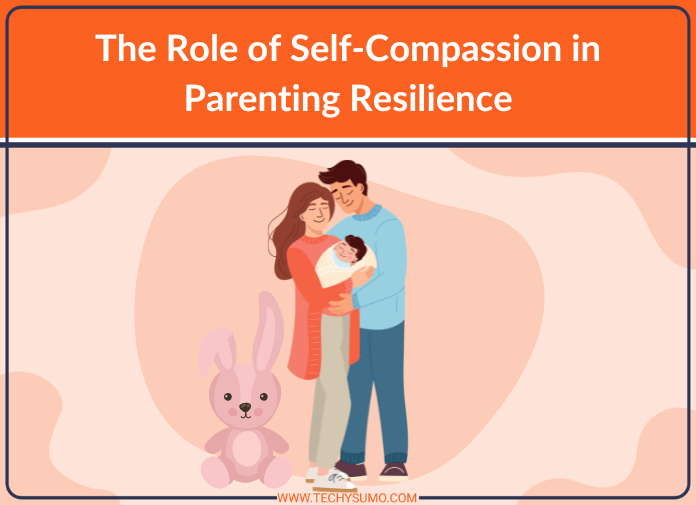Parenting is a journey filled with immense joy and profound challenges. Building resilience, the ability to bounce back from difficulties, is crucial for navigating the ups and downs. Self-compassion, which means treating yourself with kindness and understanding, especially during tough times, plays a vital role in developing this essential parental resilience.
Table of Contents
Understanding Self-Compassion
Self-compassion involves three main elements:
- Self-kindness: This means being gentle and supportive towards yourself, rather than critical, when you face challenges or make mistakes.
- Common humanity: Recognising that everyone makes mistakes and experiences difficulties is part of being human. You are not alone in your struggles.
- Mindfulness: This involves acknowledging your difficult thoughts and emotions without judgment or over-identifying with them.
It’s about offering yourself the same warmth and understanding you would offer a good friend who is struggling.
Why Self-Compassion is Important for Parents
Parents often put immense pressure on themselves to be perfect. When things don’t go as planned, it’s easy to fall into self-criticism. This is where self-compassion becomes a powerful tool. It helps parents to:
- Reduce stress and anxiety: By being kinder to themselves, parents can lessen feelings of stress and anxiety, which are common in the demanding role of raising children.
- Improve mental wellbeing: Self-compassion is linked to better mental health, including reduced depression and increased happiness and optimism.
- Model healthy coping for children: When parents practice self-compassion, they show their children that it’s okay to make mistakes and to treat themselves with kindness. This helps children develop their own self-compassion.
- Strengthen family relationships: A parent who is less stressed and more emotionally balanced can create a more nurturing and stable environment for their children. This can lead to better communication and stronger bonds within the family.
- Navigate challenges more effectively: Parenting often involves unexpected hurdles. Self-compassion provides an inner support system, allowing parents to face difficulties with greater emotional stability and to see mistakes as learning opportunities.
Building Parental Resilience Through Self-Compassion
Resilience in parenting means being able to handle stress, solve problems, and stay calm even when things are tough. Self-compassion directly contributes to this by:
Also Read
- Building a positive mindset: It encourages parents to view challenges as temporary and manageable, rather than overwhelming.
- Promoting self-care: Recognising your own needs and taking steps to care for yourself is an act of self-compassion and is vital for maintaining wellbeing.
- Reducing burnout: The constant demands of parenting can lead to burnout. Self-compassion helps parents to acknowledge their limits and seek support when needed, preventing emotional exhaustion.
- Encouraging adaptive coping strategies: Self-compassionate individuals are more likely to use positive coping mechanisms like acceptance and problem-solving, rather than avoidance.
For those in particularly demanding parenting roles, such as foster care, self-compassion is incredibly important. Agencies like Orange Grove Foster Care recognise the challenges foster carers face and provide extensive support systems. This support can include access to social workers, support groups, and even respite care, all of which can help foster carers practice self-care and build resilience.
Practical Ways to Cultivate Self-Compassion
Developing self-compassion is a skill that can be learned and strengthened over time. Here are some simple ways to practice:
- Treat yourself like a friend: When you’re struggling, ask yourself what you would say to a friend in the same situation. Then, offer yourself that same kindness and understanding.
- Practice mindfulness: Take a few moments each day to notice your thoughts and feelings without judgment. Simple breathing exercises or a body scan meditation can be helpful.
- Acknowledge your efforts: Remind yourself that parenting is a challenging job and that you are doing your best, even when you make mistakes.
- Write it down: Journaling about your experiences and feelings can help you process them with a more compassionate perspective. Writing a kind letter to yourself can also be beneficial.
- Use affirmations: Positive statements about yourself can help to counteract negative self-talk. For example, “I am doing my best, and that is enough.”
- Pause your inner critic: When you notice self-critical thoughts, take a breath and acknowledge them without letting them take over.
- Connect with others: Sharing your experiences with other parents can help you feel less isolated and realise that many people face similar challenges.
The Lasting Impact
By cultivating self-compassion, parents can build the resilience needed to navigate the complexities of raising children with greater calm and confidence. This not only benefits the parents’ own well-being but also creates a more positive and supportive environment for children to thrive. It’s a powerful way to nurture both yourself and your family, leading to greater happiness and stronger relationships. Remember, being kind to yourself is not selfish; it’s an essential part of being a resilient and effective parent.






